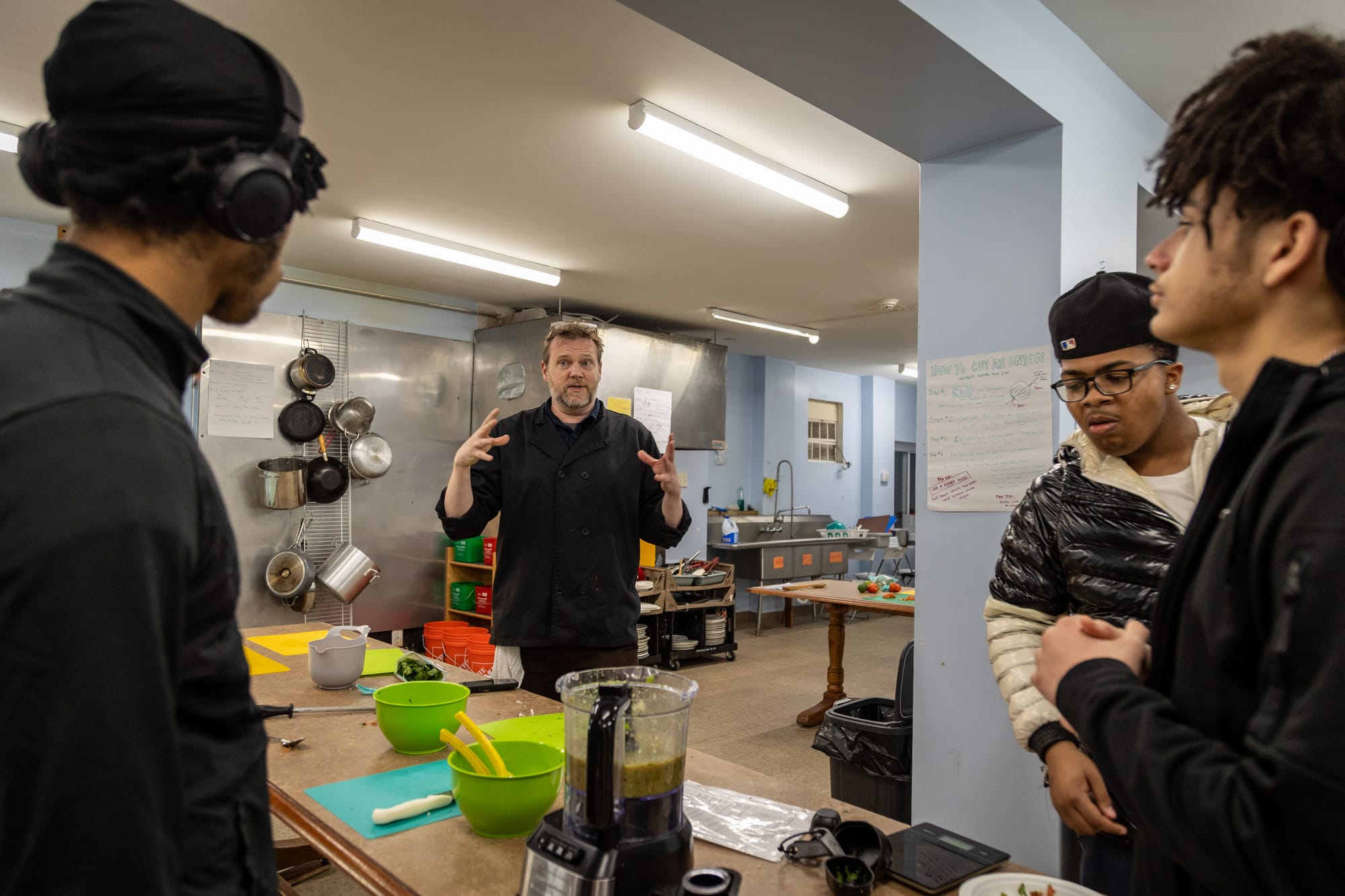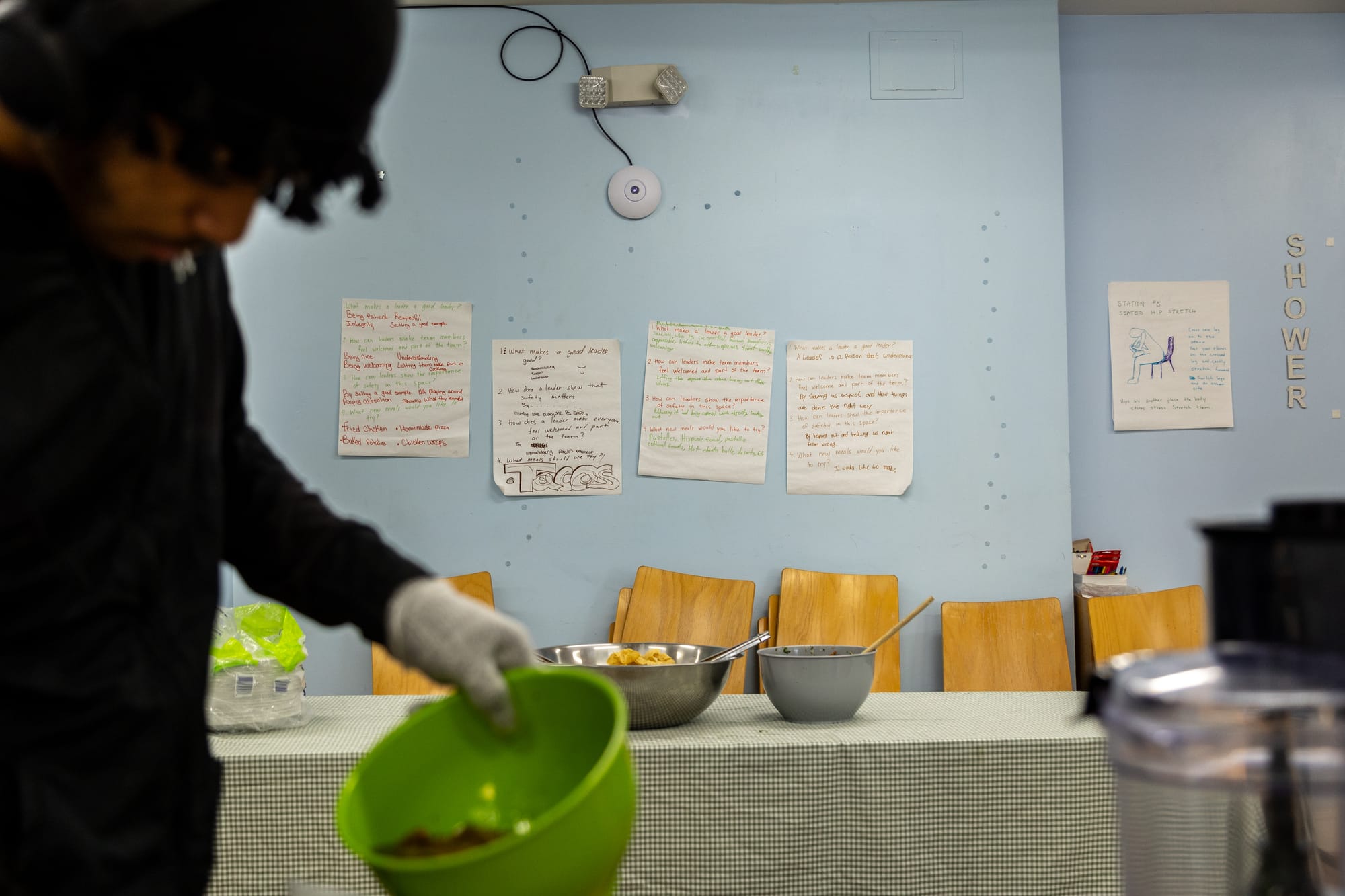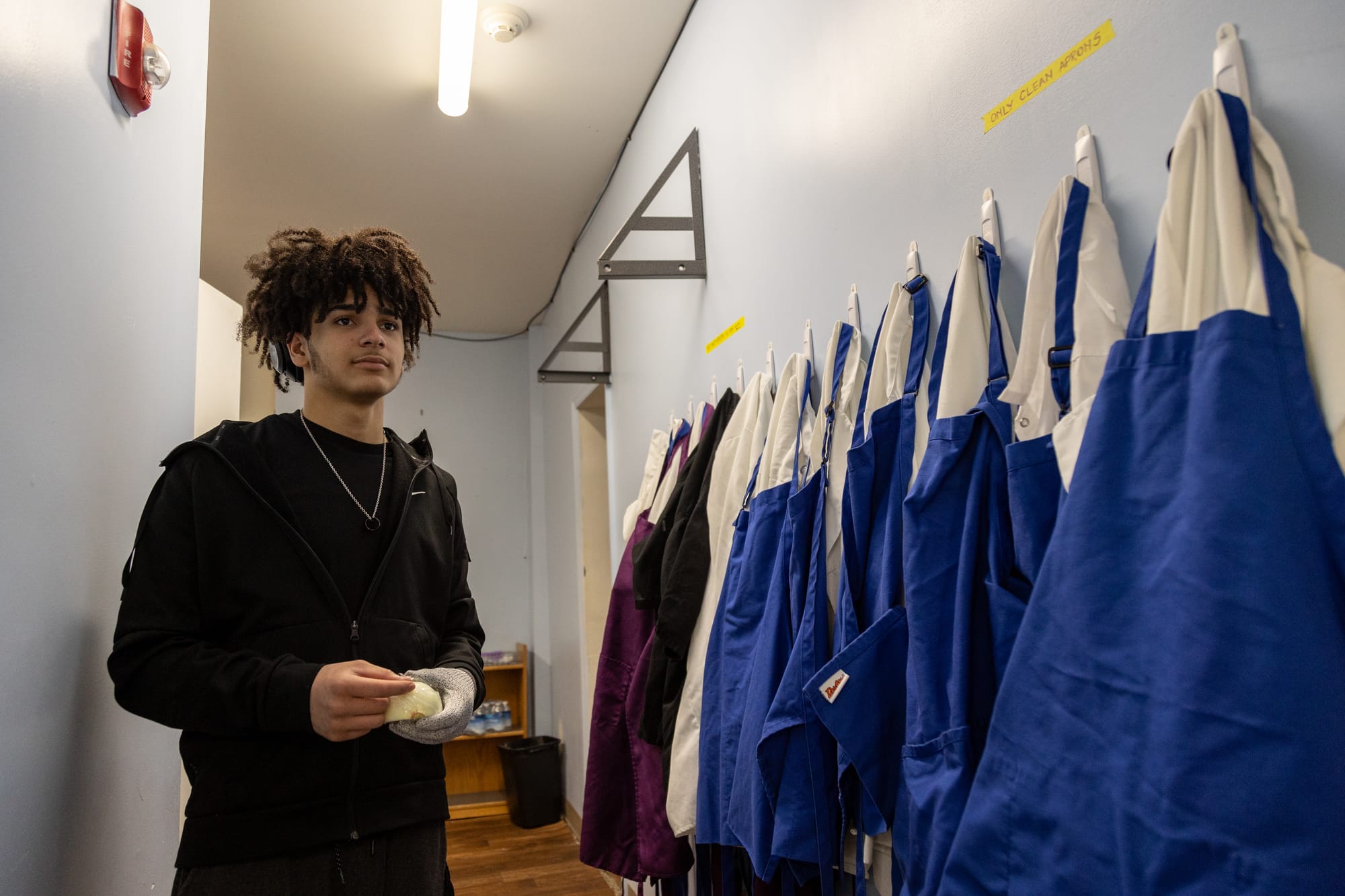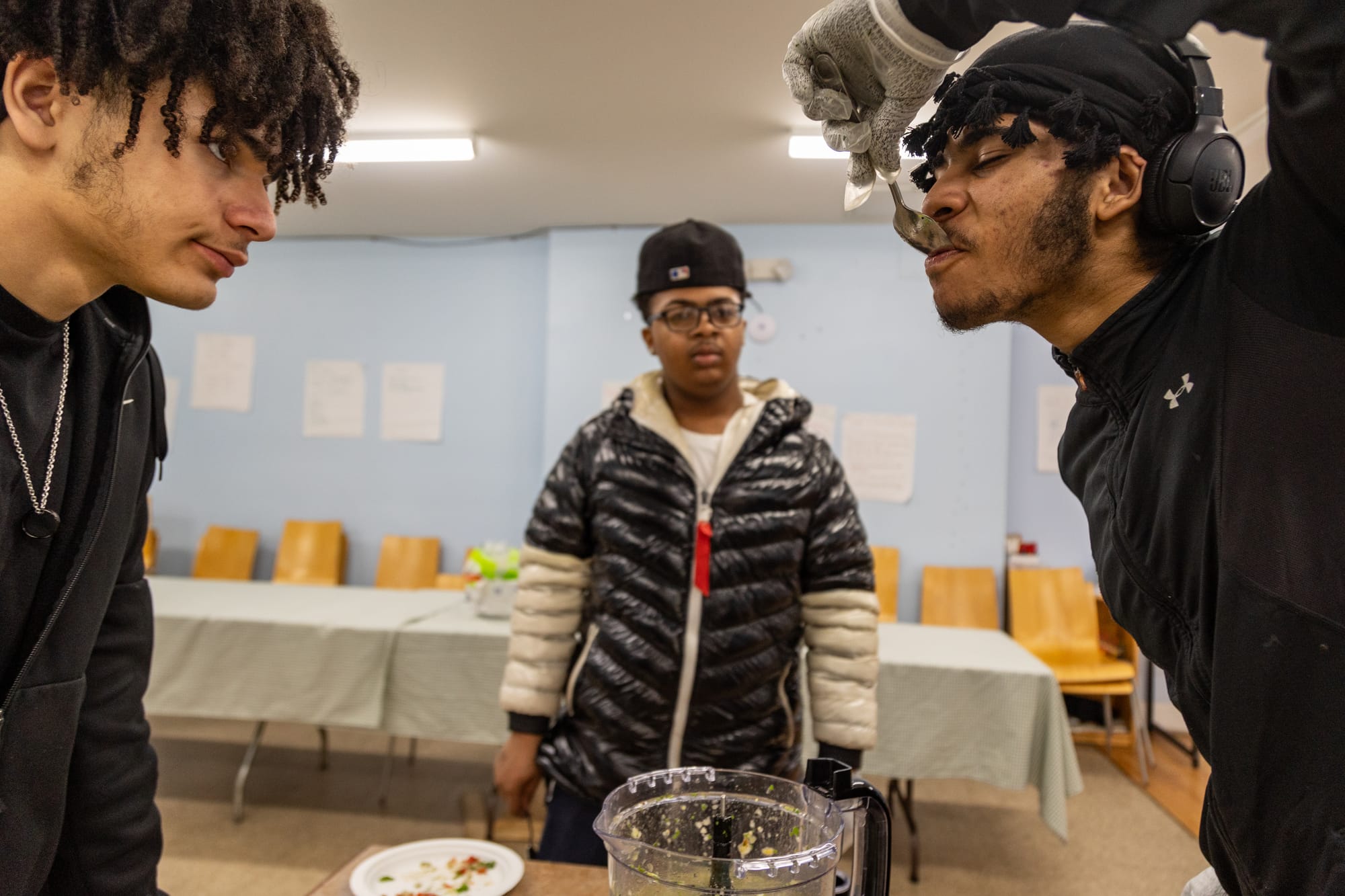Conwell grad Councilmember Isaiah Thomas opposes middle school's closure
A key member of the Philadelphia City Council has already expressed opposition to parts of the district’s plan to close, relocate, and co-locate several schools.
PB&J’s Wednesday Leadership program incentivizes teens to build communication skills while cooking together.

In 2023, Bryan Belknap had to make a change.
The grant that had funded his youth mentorship work at Kensington’s McPherson Square Library for eight years was expiring. He worried that his departure would leave teens without the stability and encouragement he’d tried so hard to provide.
“I got to know a bunch of young people who faced lots of challenges and saw how the current system often fails them,” Belknap said. “It gave me time to think about what a program would look like that didn't let these young people fall through the cracks.”
Within months of leaving the library, Belknap founded Philly Bridge & Jawn (PB&J). It’s an afterschool and weekend cooking program designed to help prepare teens ages 12 to 19 for the demands of an official job, while teaching them basic culinary and leadership skills. Teens prepare food together while practicing kitchen safety. They also receive rewards for communicating clearly, helping each other out and pledging to keep the environment emotionally and physically safe for each other.

Programs like PB&J are proven to be beneficial to low-income youth, who may come from chaotic or unstable home environments. In Kensington, Belknap says providing a calm environment and offering professional development is key to bolstering teens’ mental health.
According to estimated census data for five years, completed in 2015, 42% of children in Kensington under the age of 18 live in poverty, and 58% of children under the age of 18 live in single-parent households. That’s compared to just 12% and 25% of Center City children, respectively.
Because of a lack of resources, these youth are more susceptible to many negative factors, including poor mental health and stunted development, according to experts. And those factors affect children more as they get older.
According to a 2025 survey from advocacy group Children First PA, 48% of high school students in Philadelphia reported feeling sad or depressed most days. About a quarter reported having considered suicide.
Belknap encounters students who are going through a lot – some of them have been abused, been victims of crime, or are struggling with substance use. He says the program aims to serve teens from all backgrounds.
“You don't know who's experiencing trauma,” he said. “So what you have to do is prepare your program so that if somebody comes through the door experiencing trauma there, they're in an environment where they can still thrive.”
Destiny Thomas, 18, joined the program on a recommendation from a friend. She said activities such as group stretching exercises and the kitchen safety classes have helped her stay grounded both during the program and in her home life.
“As a person who struggles with mental health myself, doing stretches, or going on doing something that's physical, it does help you with your mental health.”
How it works
For its first full year of operation, PB&J ran as two seasonal pilots in Fall 2023 and in Spring 2024. Each pilot went on for five consecutive days and included presentations from partner organizations offering jobs and other resources, such as additional afterschool programming and mentorship.
Now, it takes place twice each week at its own location at 3415 Kensington Ave. Belknap recruited extra volunteers so he could host 30 teens on Sundays instead of 20.
The program runs on Wednesdays and Sundays from 3:30 to 5:30 p.m., for teens ages 14 to 19. Once a participant attends a Sunday session – mostly focused on cooking and communication – they can join the Wednesday program, which is focused on leadership.

Wednesday participants learn to take on new responsibilities such as welcoming new participants, encouraging conversation, leading small groups, monitoring kitchen safety and mediating conflict.
In the years that Belknap has served Kensington youth, he’s found that many struggle with listening to authority and adhering to a schedule. His approach consists of providing teens a missing sense of stability and practicing patience with them, gradually disarming their trauma responses to authority.
“I had some of my teenagers being defiant and not being a part of the program, but now they are great role models,” he said. “And even the ones I know were struggling are now participating.”
Teens make $20 for participating in the full Sunday program, and extra if they stay longer to help clean up. They also gain “points” for exemplary behavior. Once a teen has 15 points, they gain the title of “leader” and are trusted to facilitate certain activities.
Another key feature of the program is the pledges; before the program starts each day, the teens gather around to view and read aloud the list of pledges on the wall. Through these pledges, the teens promise to keep each other safe, be kind to each other and keep outside issues out of the program. To ensure the pledges are kept in place during the day, the “leaders” are assigned to mediate any conflict.
Frayan Taveras-Rodriguez, 15, has been coming to the program for four months and says he has become a better leader. He also feels he manages stress better at home and in school, and he uses his newfound cooking skills to help his parents make meals.

He also said that being in the program has helped him prepare for the responsibility of working full-time. He feels the program will give him an advantage when searching for a job.
“The program is a great place… It's just here to help you grow up,” he said.
Building a Sanctuary
The walls of PB&J’s space hold multiple instructions for different stretches teens can do to release stress. There are also other instructions for breathing exercises and recentering using one or each of the five senses.
These visual instructions, along with the pledges and the implementation of “leaders,” aim to foster an environment for improving mental health and support during high-stress situations.
Patricia Codina is a board member and occasional volunteer for PB&J. She has experience with trauma-informed approaches, such as the SELF framework – which stands for Safety, Emotions, Loss and Future.
It’s part of the Sanctuary model, which promotes safety and recovery from adversity by creating a community where people can address their trauma with help from others.
For teens, that starts with teaching them to be aware of their own feelings and controlling their responses.
“It’s a really good practice to then start to get a hold of those emotions that can sometimes lead people to have really irrational or even some dangerous, risky behavior.”
On a recent Sunday, Codina said she shared in SELF conversation with the teens after a family caused a commotion that triggered different responses in the room. Before the conversation, she and Belknap observed that some kids felt excitement and familiarity with the commotion. Others felt fear and expressed hesitancy around returning to the program.
Codina began the conversation by acknowledging the teens’ mixed reactions and emotions, and the science behind how the body reacts to unsafe, high-stress situations. Then, she and the teens created a plan for what teens could do if another high-stress situation were to come up, such as removing themselves from the situation and de-escalating the issue.
According to Codina, it is “super important” for teens to learn about emotional regulation in a safe environment.
“There's a lot of brain development happening with teenagers, so having a moment to pause and manage an emotion, for example, is not something that teens probably do very often, but it's a big part of developing emotional intelligence,” she said.

Strengthening communication through cooking
During an open house event, three “leaders” made chips and salsa together to showcase to potential adult volunteers what a regular day in the program would look like. The teens joked about the salsa not being hot enough and searched for ingredients to up the spice factor.
After making adjustments, they all gave it a taste test and passed samples around to the adults observing. One of the teens winced, and they all laughed as they realized they may have taken it too far.
Through cooking together, the program’s teens create many moments like these and develop authentic relationships within the realm of safety they pledged to cultivate together.
Layla Johnson, a 14-year-old participant in the program, has attended PB&J for two years. She enjoys learning to cook various dishes like tamales, and taking those recipes home to cook for herself and her family.
Through the leadership program, Johnson has learned how to be more patient with and empathetic to others. She says she’s gained friendships and better communication skills during her time in the program’s kitchen.
Johnson appreciates Belknap’s leadership and the program's impact on her life.
“I had a really hard time talking to people because they frustrate me when they're not listening. But, [through the program], I learned to just give people time to talk,” she said.
Some teens attend mostly for social interaction. Like Thomas, a homeschooled student who says that the program is an opportunity for her to be around other youth her age.
Beyond learning kitchen safety and gaining cooking skills, Thomas said she also learned more about the other youth who live in the area. Through her peers, she’s discovered new music and the typical demeanor of the youth in the community.
“Y'all are very loud, very, very loud. But y'all are very sweet,” she said, jokingly.
Belknap recently offered a five-day pilot in addition to the twice-weekly program. Regular cooking and leadership classes will continue throughout the summer.
This story is part of “Paths for Youth,” a three-part series focusing on organizations that empower Kensington teens through workforce development, mentorship, and mental health support. This reporting was supported through the HEAL Fellowship program of the Solutions Journalism Network.
Free accountability journalism, community news, & local resources delivered weekly to your inbox.